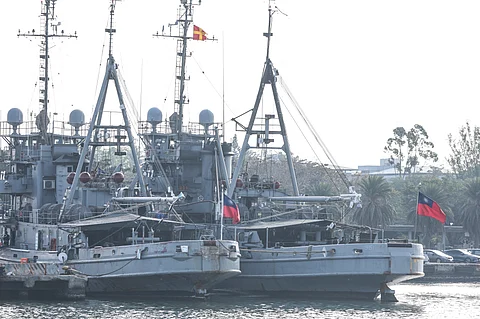
- NEWS
- the EDIT
- COMMENTARY
- BUSINESS
- LIFE
- SHOW
- ACTION
- GLOBAL GOALS
- SNAPS
- DYARYO TIRADA
- MORE

KAOHSIUNG, Taiwan—As China ramps up its military pressure on Taiwan, the island’s armed forces are facing a critical personnel shortage. Despite efforts to boost recruitment, Taiwan’s volunteer military remains significantly understaffed, with only 80% of the required personnel.
Between 2022 and 2024, approximately 12,000 service members left the military, raising concerns among both government and defense officials. Discussions about allowing foreign migrants to enlist have resurfaced, though no formal policy steps have been taken despite the idea being informally debated for over two decades.
Taiwan’s declining birthrate, the second-lowest in Asia after South Korea, is a major factor affecting military recruitment. While military salaries are generally competitive, many young people prefer private-sector opportunities. Although low morale is often cited, experts argue that the situation is more complex.
Dr. Chang Ching, a senior research fellow at the R.O.C. Society for Strategic Studies and a former naval officer, expressed skepticism about the prospect of migrant troops. “For almost 25 years, the idea has been floated, yet no official panel or committee has seriously explored it,” Chang told Fox News Digital. He also questioned the willingness of Taiwanese citizens to make wartime sacrifices. “Using migrant workers as mercenaries would only highlight how few Taiwanese are willing to fight—even to preserve the status quo.”
With China intensifying both its rhetoric and incursions into Taiwan’s air and sea defense zones, maintaining a strong and well-trained military is crucial for the island’s defense. However, Taiwan is not alone in its enlistment struggles. Many modern militaries, including China’s, are grappling with similar challenges in attracting and retaining personnel.
American YouTuber Christopher Clifford, known as "Uncle Topher," has gained a following in Taiwan for his analysis of global security issues. As a former U.S. Army captain who served during the 2003 Iraq invasion, Clifford frequently challenges the notion of an inevitable Chinese invasion. He argues that economic constraints and demographic factors, such as China’s now-defunct one-child policy, make an all-out war unlikely. “Most of China’s young men are only sons, expected to carry on their family lineage. That’s a serious deterrent,” he said.
Despite falling recruitment numbers, Clifford believes Taiwan is making positive changes, such as relaxing height restrictions and allowing tattoos. “Previously, anyone taller than 6’6” couldn’t enlist,” he noted.
Taiwan’s approach to military service has evolved significantly over the years. From the 1950s to the early 2000s, all men were required to serve at least two years. However, as Taiwan transitioned into a full democracy, the government gradually reduced conscription. By 2013, mandatory service had been cut to just four months of basic training.
In 2022, then-President Tsai Ing-wen reinstated the one-year service requirement, which took effect in January 2024. While the decision was met with some resistance, there were no major protests. The same month, Taiwanese voters elected William Lai as president. His victory was met with hostility from Beijing, further straining cross-strait relations.
Another factor affecting recruitment is Taiwan’s 2018 pension reform, which cut military pensions by 15-20% to prevent financial insolvency. While many Taiwanese supported the move, those affected viewed it as a betrayal. According to Chang, these cuts have discouraged families with a history of military service from encouraging younger generations to enlist. “When veterans tell their grandchildren, ‘Don’t sign up—they won’t keep their promises to you,’ that carries weight,” he said.
Taiwan has over 800,000 migrant workers, primarily from Indonesia, Vietnam, Thailand, and the Philippines. Some policymakers believe these workers could help fill military gaps. Clifford suggests a practical approach: a foreign legion focusing on logistical support roles rather than combat. “They could work as mechanics, engineers, or cooks, helping with construction projects and disaster relief in peacetime and supporting defenses in wartime—no rifle required.”
Despite these proposals, Taiwan remains reliant on its primary ally, the United States, for military support. President Lai has pledged to increase defense spending, and Taiwan is awaiting nearly $22 billion in U.S. arms deliveries. However, ensuring that these weapons can be effectively operated remains a pressing concern.
As Taiwan faces mounting security threats, the question remains: Can it rebuild its military strength in time to deter aggression, or will it need to rethink its entire approach to defense?
(Sources: Eryk Michael Smith, Fox News; AFP; Christopher Clifford, YouTube)
